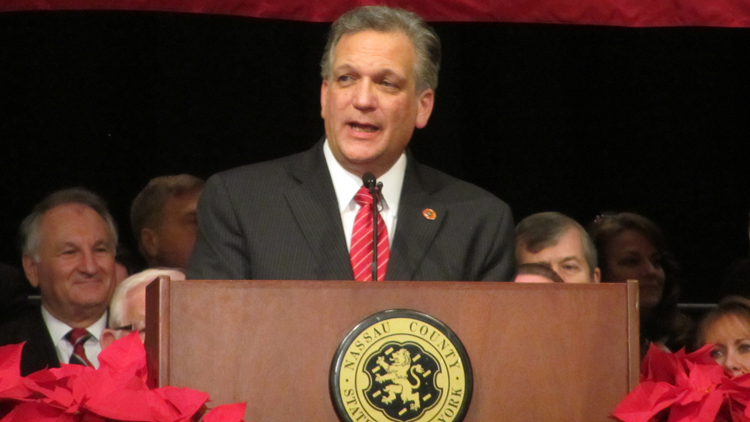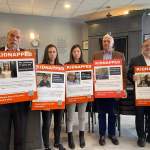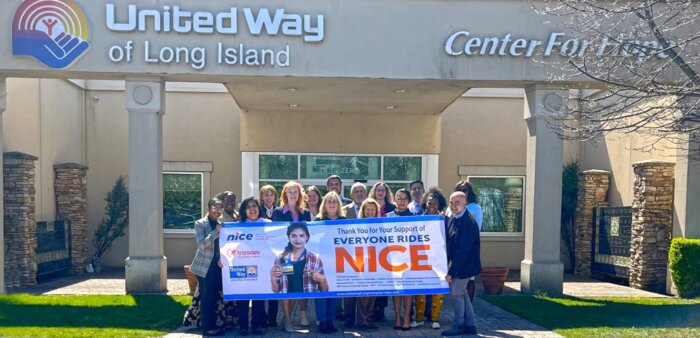A 3.4 percent Nassau County property tax hike proposed by Republican County Executive Ed Mangano was approved Monday by a New York State appointed watchdog panel that controls the county’s troubled finances.
The Nassau Interim Finance Authority voted unanimously to approve next year’s $2.98 billion budget, which was the first ever to include a tax hike by Mangano in his five years in office. The administration said it was intended to raise $31 million to offset a steep decline in sales tax revenue. The move came after a showdown with county legislators, who approved an alternative budget that nixes the tax hike—a plan that Mangano vetoed.
Right before the NIFA vote, Democratic minority counsel Peter Clines interrupted the meeting to reiterate what he wrote in a letter to the board, arguing that Mangano had violated the county charter by misusing “his line item veto power to unilaterally impose such property tax increase on the citizens of Nassau—a tax increase which was unanimously rejected by the County Legislature.”
NIFA Chairman Jon Kaiman, the former Town of North Hempstead supervisor, rebuffed him and later warned about potential repercussions of the legislature’s implied threat to sue over the tax increase.
“To turn this particular forum into one where we’re creating a debate-type atmosphere is really not appropriate,” Kaiman said, acknowledging receipt of the letter that day. “If there’s a lawsuit that’s brought to punch a $30-, $40-, $50-, $60-, $120-million hole without covering it,” Kaiman summarized, “then that would void this plan.”
At the beginning of the public session, the board heard NIFA executive director Evan Cohen read a report that said the county’s multi-year budget plan “now provides a roadmap” for achieving a budget balance by 2018, although the goal itself “remains elusive” because the county “continues to outspend its available revenue.”
But he said that NIFA has been encouraged by developments in Albany where Gov. Andrew Cuomo and the State Legislature have taken steps to help Nassau curtail its expensive practice of borrowing to pay for property tax refunds, particularly what’s called for commercial property owners, beginning in 2017. The moves could save the county more than $70 million annually.
“There are great challenges ahead,” Kaiman exclaimed, but “I think this plan better serves the people of Nassau County.”
In the days leading up to the NIFA meeting, Minority Leader Kevan Abrahams (D-Freeport) had urged the GOP majority on the Legislature to join with his caucus and “stop the ‘Mangano Tax Hike,’” but the Republican legislators had “hung up their hat,” as he later put it in a statement, and instead decided to “pass the buck.” Presiding Officer Norma Gonsalves (R-East Meadow) had said that overriding the veto would be “futile.”
“The legislature is exercising itself over $31 million,” NIFA board member Christopher Wright told the Press after the NIFA meeting ended. “I’d much rather they focus on balancing a budget that has a $150 million deficit.”
“Our position simply is we need to look at the budget in total and see if it works,” Kaiman told the Press. If the legislature somehow “carves out” from the budget the $31 million added by the tax hike, he explained, then the NIFA board will have to make up the shortfall to achieve a balanced budget.
“Usually it’s the legislature’s job to do that,” he said, “but if they choose not to do that, then we will have to do that ourselves.”
Kaiman bristled when the Press asked him about passing Mangano’s property tax hike.
“We’re not approving or disapproving a tax increase,” he said. “We’re approving a budget that has revenue projections based on the amount of taxes they collect and expenditure based on the amount that they spend. We don’t take a position on how they raise it. Our goal is to make sure that the numbers add up.
“They could have cut $30 million in expenditures and achieved the same thing,” he continued. “Whether that’s possible or not, there comes a point where there’s no more people to lay off.”
The county executive had to resort to raising the property taxes because sales tax receipts dropped sharply this year and cutting wasteful government spending didn’t go far enough, according to Mangano spokesman Brian Nevin. But the county executive hopes to ease the burden thanks to a program created by New York State “that allows Nassau County to collect $33 million of the tax dollars we send to Albany yet never get back,” Nevin told the Press in an email. The program reimburses all homeowners earning under $500,000 a year, so they should “have no additional out of pocket expense for a sixth straight year on their county property taxes.” The reimbursement is reportedly $41 on average.
Last year, Mangano had run on anti-tax platform when he crushed Tom Suozzi, a Democrat, and handily won re-election—unlike the first time the two men faced each other in 2009 when Mangano scraped by with 386 more votes. When Suozzi was Nassau county executive starting in 2001, he had raised property taxes twice after defeating Republican County Executive Tom Gullota, who nearly bankrupted the county. When Mangano first challenged Suozzi in 2009, his supporters called the incumbent Democrat “High Tax Tom” because he’d hiked taxes by more than 26 percent during his administration. Mangano’s supporters repeated the moniker to great success in 2013.
At a debate held at the Crest Hollow Country Club in Woodbury in the final days before that fall election, Mangano vowed, “I have zero plans to raise property taxes.” For the record, Suozzi said he didn’t plan to raise them, either.
In other NIFA business, the board voted to approve $125 million in bonds to start paying off property tax challenge settlements. But NIFA balked at giving “pre-approval” to allow Nassau to borrow $11.5 million in case the county loses its appeal on a strip-search class-action lawsuit involving the county jail. Kaiman told Lisa LoCurto, the chief deputy county attorney from the Nassau County Attorney’s Office, that if the county has the funds when the judgment comes down, then the county should pay the settlement, but “the county is requesting authorization for a bond that is not ripe.”
NIFA board member Christopher Wright added, “Borrowing for routine judgments is probably the easiest bad habit we can break for the county.”
Then Clinis stood up from his seat to defend the borrowing for the lawsuit settlement, which irked Kaiman further.
“The county has the ability to create a tort reserve fund,” Kaiman told the minority counsel. “Clearly the legislature believes there’s plenty of money to be had. So use the money that you have. We’re all for it.”
Kaiman continued, “The larger discussion is that we’re authorizing the bonding because the county is taking certain measures to cover its obligations. If the county were to fail to do that, then you simply cannot authorize the continued growth in debt when the county itself fails to take the proper measures to address its financial need.”



























